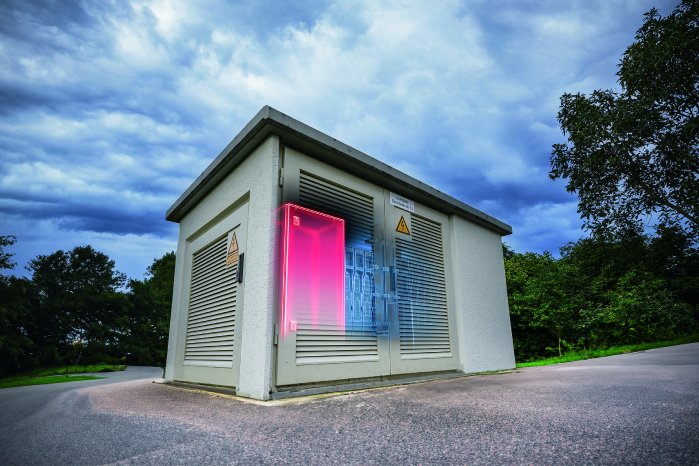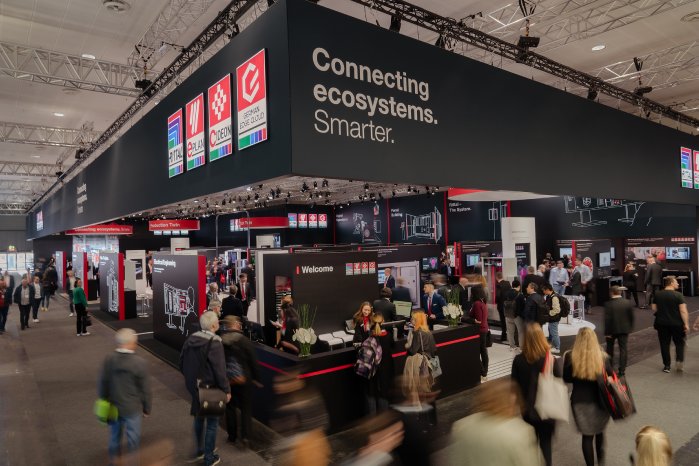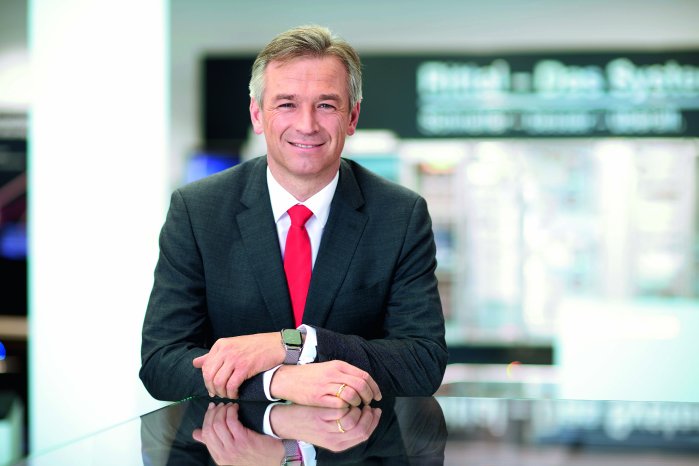Industry is in the midst of a digital transformation. At the same time, it must also meet increased demands for greater sustainability – the move towards an “all-electric society”, for example, is a high priority. This is a huge task, and one that will have to be accomplished with fewer and fewer skilled workers. From the perspective of the companies in the Friedhelm Loh Group, the key lies in mechanising and streamlining processes across the entire value chain.
At the Hannover Messe, Rittal, Eplan, Cideon and German Edge Cloud show how customers can make rapid progress: “The principle of industrialising entire processes and systems requires the intelligent combination and coordination of software and hardware. However, this can only work if there is data consistency across the entire value chain,” says Markus Asch, CEO of Rittal International and Rittal Software Systems: “Our approach is based on standardised, modular solutions, exactly tailored to the specific application. This calls for precise knowledge of the customer’s processes and close interaction with customers as equal partners. At the Hannover Messe, we will be showcasing the results of this collaborative cooperation as well as examples of how our customers’ efficiency and productivity can be seamlessly Hannover Messe increased across their entire value added processes – from end to end.”
Customers are given a quick application-based introduction via four key areas of Industrial Automation, Panel Building, Energy Transition and the Smart Factory. From there, products, software and system solutions for specific requirements are presented in four deep-dive areas.
Industrial Automation: More Efficiency
How can standardisation in planning, design and engineering lead to greater digital consistency and efficiency – and for different tasks in automation technology? Eplan, for example, will offer a first glimpse of Cable proD, a future software application for cabling machines virtually as well as the advanced features of the "eView AR" app, which uses augmented reality to superimpose the actual enclosure on its digital twin. Users can also look forward to viewing the forthcoming Eplan Platform 2025. Cideon will present the Sparify software application, which simplifies parts management with information from CAD models and PDM.
Panel Building: More Productivity
How can panel building and switchgear manufacturing become even more efficient and productive in times of skilled labour shortages? The answer is data consistency across the entire value chain, from electrical engineering through systems engineering and panel building to the digital operation phase of the systems. Rittal is expanding the possibilities with advances in the AX enclosure series, the new CX console system or bayable CS Toptec outdoor enclosures. It is also providing energy-saving cooling solutions. Rittal Automation Systems is increasing automation on the shop floor with the optimised CT M3 cutting terrminal and new machinery from Ehrt, such as the BT 20E bending terminal for bending busbars and the PT S4 punching terminal for easy entry-level busbar processing. Rittal is looking to the future with a pilot sample for the fully automatic wiring of control components. Visitors will also discover how the modular RiMatrix platform enables IT infrastructures to be set up quickly and energy-efficiently to meet the growing demand for computing performance. Highly standardised racks for the Open Compute Project (OCP), which are already fit for future AI applications and with integrated liquid cooling, will also be on display.
Energy Transition: More Speed
How can the expansion of energy systems increase the speed of value chain processes? Opportunities are growing, due to a higher degree of digitalisation and standardisation, along the lines of mechanical engineering. Visitors to the trade fair will see concrete implementation based on the example of a transformer station. The idea is that Eplan offers a complete a complete standards-compliant industrial system, including an industry-specific equipment and parts list. It only needs to be customised and adapted as required. The data pack furthermore includes all information required to adopt Rittal's modular system technology and for processing with machines from Rittal Automation Systems and Ehrt in further processes. The result: Significantly less work and time, lower costs, standards-compliant design and a digital twin for operation.
A preview of the new Rittal RiLineX 60-mm busbar system platform shows visitors that there is still substantial potential for further optimisation in system technology. This will set a new standard for power distribution in 2025. The system was not only redesigned to increase the speed, safety and reliability of engineering but also take assembly and installation to a new level. Rittal also consistently follows the platform approach. Manufacturers of equipment and components receive the necessary interface data without the need for a licence, enabling them to develop suitable technologies and devices themselves.
Smart Factory: More Transparency
How can industry quickly and efficiently lay the foundation for managing production based on the availability of scarce energy in the “all-electric society” and take full advantage of the potential of artificial intelligence in the future? With the ONCITE Digital Production System (DPS), German Edge Cloud makes digitalisation scalable even for small and medium-sized suppliers, from digital transparency and consistency as a basis via AI-supported processes to a fully digitalised factory. Innovations include an AI-based visual quality inspection service with development prospects for the application of generative AI (GenAI) and a case for using GenAI in production information management. Other displays highlight the easy connection to Catena-X and Supply ON with the ONCITE DPS CX Gateway as well as Track & Trace in the Smart Press Shop with Schuler.
The primary message showcased at the booth of the four Friedhelm Loh Group companies: The demands of digitalisation and sustainability are not inconsistent, contradictory or mutually exclusive – in fact, they go hand in hand. Sustainability drives digitalisation, while digitalisation supports and empowers greater sustainability. The key here lies in consistently optimised value creation processes.
Rittal
Rittal is a leading global supplier of enclosure systems, automation and infrastructure to the industrial, IT, energy and power, cooling and service sectors. Rittal products and solutions are used in over 90% of global industries – standardised, customised, and always of the very best quality. Our approach: Our approach and methodology: Rittal, Rittal Software Systems (Eplan, Cideon and German Edge Cloud) and Rittal Automation Systems (RAS, Ehrt, Alfra) combine their hardware and software expertise to streamline, optimise and digitalise processes across the entire value chain for our customers including their IT infrastructure – from control and switchgear construction, machine building to factory operators or the energy sector.
Our promise: Rittal standard products are delivered within 24 hours in Germany, and within 48 hours worldwide.
Fully focused on our customers
Improving efficiency and increasing productivity through automation and digitalisation is one of the biggest challenges for our customers. This requires in-depth knowledge and expertise, the combination of hardware and software, and cross-sector networking. We are convinced that creating and connecting data spaces is crucial to the success of industrial transformation. And that is exactly our speciality and field of competence. Eplan and Rittal are driving the development of the digital twins of equipment and systems and are making the data more accessible and operationally useable. Cideon is improving digital continuity and data consistency in relation to digital product twin context with its CAD/CAM, PDM/PLM and product configuration expertise. German Edge Cloud’s ONCITE Digital Production System (DPS) makes the data from the manufacturing processes transparent and thus optimisable – right up to energy management via the digital production twin.
Sustainability
Environmental and climate protection, social commitment and ethical corporate management are a given for Rittal. We take our responsibility for a sustainable future seriously. Our approach to resource management and conservation involves continuous improvement of our production processes and ensuring that our products and solutions have the lowest possible Product Carbon Footprint. This supports our customers in achieving their climate targets.
Family business and global player
Founded in 1961, Rittal is the largest company in the owner-operated Friedhelm Loh Group. The group operates worldwide, with 12 production sites and 95 international subsidiaries. It had more than 12,100 employees and posted revenues of 3 billion euros in fiscal 2023. In 2023, the Friedhelm Loh Group was named “Best Place to Learn” and “Employer of the Future”. Rittal was awarded the Top 100 Seal as one of Germany’s most innovative medium-sized companies.
For more information, visit www.rittal.com and www.friedhelm-loh-group.de




